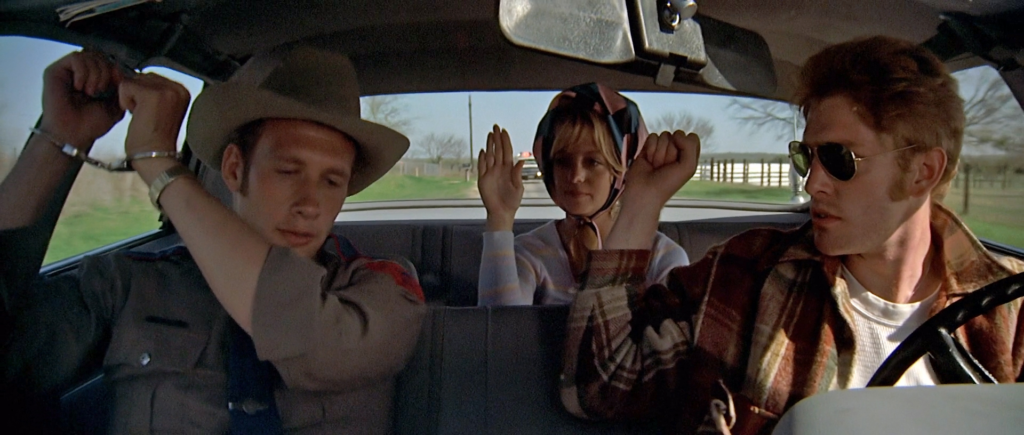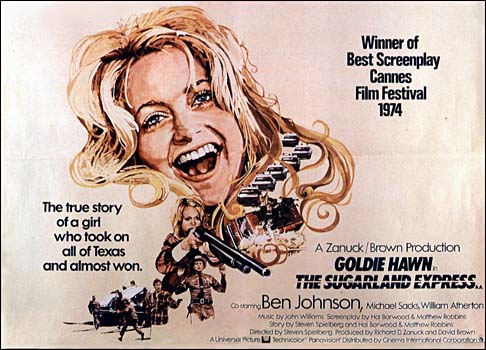The Sugarland Express, Steven Spielberg’s first theatrically released movie, was restored in 4K and screened as part of the Cannes Classics program at the festival this year. The film was originally selected for the Cannes Film Festival in 1974, and is to date the only Spielberg movie to compete in the festival. The Sugarland Express was written by Hal Barwood and Matthew Robbins, and won the Best Screenplay Award at Cannes.The film is based on a true story, and follows Clovis and Lou Jean Poplin (William Atherton and Goldie Hawn, respectively), two small-time criminals who kidnap a Texas police officer (Michael Sacks) and travel to Sugarland to see their baby, who is about to be placed in foster care. Their trip quickly becomes a very elongated, OJ Simpson-style police chase, and people all across Texas line up across highways to cheer on the couple as swaths of police cars follow in tow.

I have now had the rare pleasure of seeing two of Spielberg’s early movies in a theater, the first being Duel (1972), a TV movie following a man fleeing a crazed, terrorizing semi-truck driver, and now The Sugarland Express. Both films center around cross-country car chases, and both films are excellent showcases for the instinctual skill Spielberg wielded with a camera, even in his very early work. With both of these films, and with every Spielberg film hereafter, he never fails to impress with his impossible mix of efficiency and stylistic flair with quite literally every shot. Every camera movement has a clear purpose, and it feels as if Spielberg always has a feel for the optimal position to sequentially deliver whatever information he deems necessary to inform us about each scene and build the tension. Spielberg’s dolly zoom from Jaws is arguably the most famous use of the technique in all of cinema, but I am tempted to say that he had already produced a superior use of the technique in The Sugarland Express. I have attached a clip of the specific shot below, if you are curious.
Perhaps unsurprisingly, The Sugarland Express also displays an early mastery of many other elements Spielberg has now turned into pillars of success. By the time the credits roll, an unlikely familial bond exists between the kidnappers and the kidnapped police (in a wholesome way, not a Stockholm Syndrome way). The film is full of great comedy, and every tangential side character is memorable in one way or another. Spielberg is able to populate each and every moment with charming details that allow for Texas and its people to become a tangible character in the film as well.
I would be remiss if I didn’t mention the superb performances of William Atherton, Goldie Hawn, and Michael Sacks. Atherton and Hawn revel in a redneck Bonnie-and-Clyde rapport, with all of the recklessness and none of the sinister intent. Hawn’s performance is particularly impressive, because she is somehow able to be childish, impulsive, and tantrum-throwing in a way that isn’t annoying or abrasive, but instead indicative of an endearing naïveté and passion. Meanwhile, Sacks is able to convincingly go from the stick-up-his-ass highway patrolman to the honorary and admirable adoptee of this short-lived clan.

Speilberg was inspired by the story of Robert and Ila Fae Dent, two fugitives who kidnapped a DPS trooper named Kenneth Crone and amassed a large caravan of police cars, news vans, and curious onlookers in the process. I have no idea how much goodwill actually went between the kidnapped trooper and the fugitives in real life, but Spielberg is able to transform what could potentially be a much darker story into one that relishes in the shared connection between unlikely people in unlikely scenarios. The Sugarland Express may not be as thematically ambitious as some of Spielberg’s later films, it shares the same heartbeat that underscores many of his other classics. Full of familial love, charisma, and optimism about the goodness of the human spirit; The Sugarland Express is a great watch for anybody interested in the early work of a Hollywood legend, and anybody else who just wants to watch a good movie.

